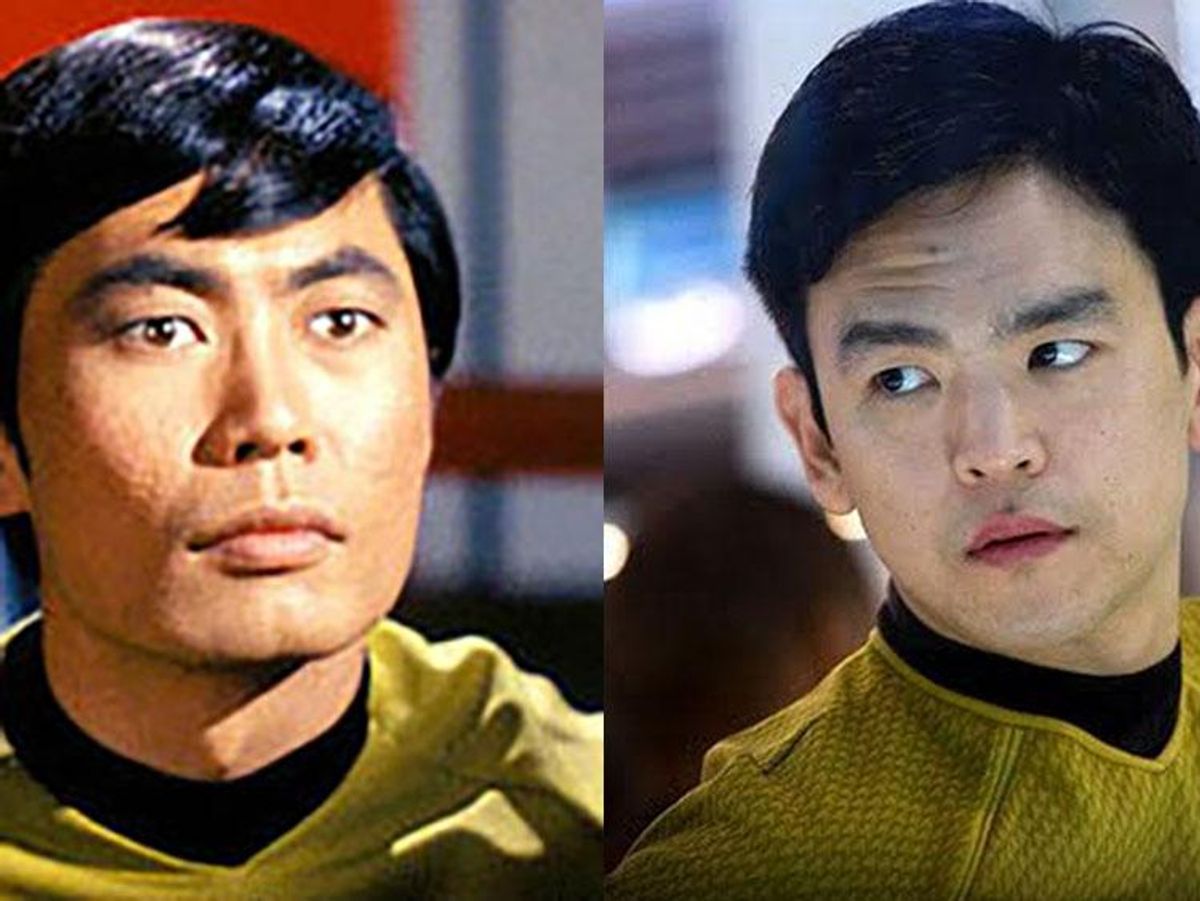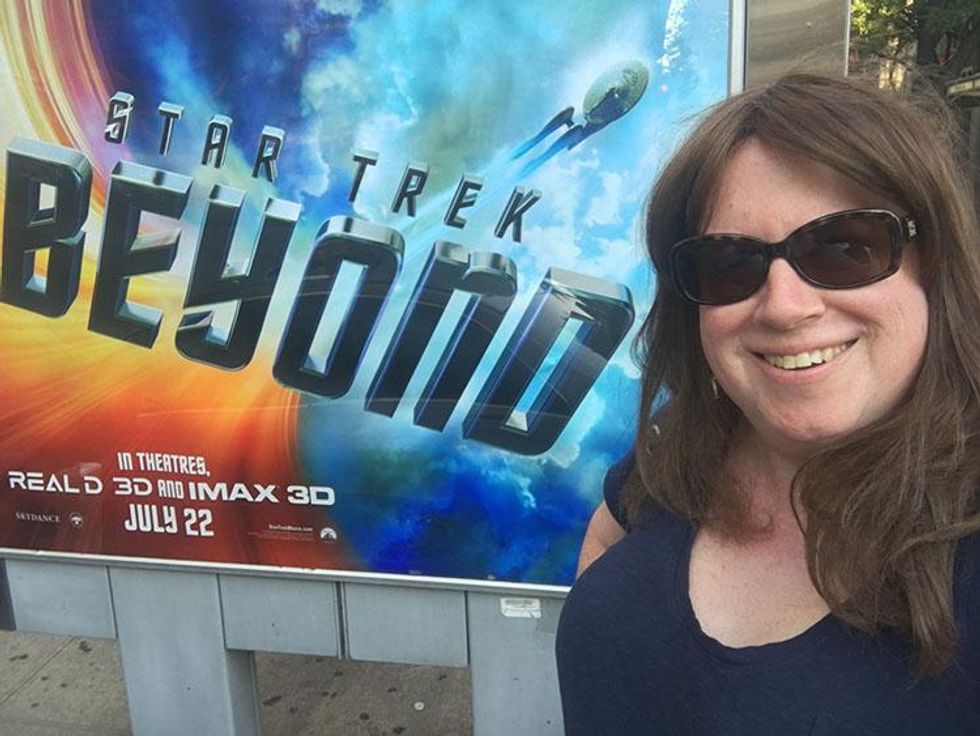The fault, dear George Takei, is not in Star Trek Beyond, but in ourselves.
If anyone is to blame for the maintenance of this sci-fi heterosexuals-only club of space cowboys, green-skinned gals and lumpy-headed aliens, it is us fans.
Yes, we fans who love Star Trek, the nearly 50-year-old television, book and film franchise about interplanetary explorers from Earth, who have kept it alive. We saved the hourly morality tale from cancellation through a groundbreaking letter-writing campaign, we pestered television stations to play endless reruns of the 79 original episodes, and we organized conventions to trade, sell, and buy memorabilia and merchandise.
We also created the cosplay phenomenon by attending those cons dressed as our favorite characters: Captain Kirk, Mr. Spock, Dr. McCoy, Scotty, Uhura, Sulu, Chekov, and of course the Klingons, Romulans, Gorn and so many more villains. In the era before the DVR, DVDs and VCRs, we memorized the dialogue from the first three years of that fabled five year mission. We explored the strange, new worlds of fan fiction, technical manuals, and novelizations. We would boldly go outside wearing what to everyone else looked like colorful pajamas.
Since 1979, the year the first movie spinoff debuted, we have sunk considerable cash in the coffers of Star Trek's owner, Paramount Pictures: $1.2 billion, not to mention all that Trek-branded merchandise, from pointed ears to plastic models, mugs, clothing and even Enterprise-shaped pizza cutters.
We kept Star Trek alive by continuing to invest in it, religiously watching four spinoff television series of varying quality and buying tickets to 11 more movies. Each new tale took creator Gene Roddenberry's concept one step further in its dramatic exploration of race, religion, politics, war, and our own humanity. Even sex was not taboo, up to a point.
And now, we come to that point. It turns out my grade school nemesis who teased me in 5th grade that "Star Trek is so gay," is finally correct.
News that the storied franchise would now have a gay main character stunned fans around the world this week, and it came from the land down under. On the eve of the world premiere in Sydney, John Cho revealed to an Australian newspaper that his character, Hikaru Sulu, the helmsman of the Starship Enterprise, would be revealed to have a same-sex partner and that they would be raising a daughter together.
Not since actor Leonard Nimoy campaigned to kill-off his character Mr. Spock in 1982's Star Trek II: The Wrath of Khan has there been this much controversy over a main character. This isn't at all like making Starbuck, the hotshot pilot of TV's Battlestar Galactica, a female character in the reboot.
The closest thing I can think of, for any non-Trek fans reading this, is: imagine inStar Wars Episode VII: The Force Awakens, if the door of the Millennium Falcon opens and for the first time in 32 years, we see Han Solo with his trusty sidekick Trubacca -- the first transsexual Wookie in that galaxy far, far away.
Their minds fans might lose, as Yoda would say. Oh, but wouldn't it be nice if Poe and Finn hooked up in VIII?
Sorry, I digress. Simon Pegg, who not only plays chief engineer Montgomery Scott but also engineered the screenplay with Doug Jung, suggested to director Justin Lin that Sulu be gay in the film, as a way to pay tribute to original series icon, LGBT activist and social media maven Takei. As Takei told The Hollywood Reporter, when Cho pitched it to his legendary predecessor, he was less than impressed.
"I think it's really unfortunate," Takei said, revealing that he made the case to Lin himself to keep Sulu straight, as Roddenberry intended.
"I said, 'This movie is going to be coming out on the 50th anniversary of Star Trek, the 50th anniversary of paying tribute to Gene Roddenberry, the man whose vision it was carried us through half a century. Honor him and create a new character. I urged them," Takei told THR. "Be imaginative and create a character who has a history of being gay, rather than Sulu, who had been straight all this time, suddenly being revealed as being closeted."
"At no point do we suggest that our Sulu was ever closeted, why would he need to be? It's just hasn't come up before," responded Pegg. He and costar Zachary Quinto, who like Takei is out, respectfully disagreed with the 79-year-old veteran actor, stressing that this Sulu occupies an alternate universe from the original Sulu portrayed by Takei. In a statement to the British newspaper, the Guardian, Pegg refuted Takei's idea that a new gay character would be best.
"He or she would have been primarily defined by their sexuality, seen as the 'gay character', rather than simply for who they are, and isn't that tokenism?" wrote Pegg.
"As a member of the LGBT community myself, I was disappointed by the fact that George was disappointed," Quinto told Pedestrian.TV, He thinks Takei will change his mind upon seeing the positive response from LGBT fans, who will now be represented in the 23rd-century, much the same way Asian-Americans felt when they saw Sulu at the helm, or how Uhura inspired countless young women and African-Americans to reach for the stars, and dream of equality.
As much as I revere Takei and love him for wanting to honor the Great Bird of the Galaxy's original vision, I find myself in agreement with this next generation. And I won't blame Roddenberry or his successors for taking 50 years to portray a main, recurring character as openly gay, lesbian, bisexual, or transgender.
It's we fans, who like the rest of America and the world have been slow to accept the LGBT community as part of society. In the case of our community, of course, "we" is really "them:" those who try to kill us in nightclubs, outlaw us in state legislatures, threaten to kill us if they find us in the ladies room with their wives and children, erase us because they think bisexuality is just a phase, or judge us because we are intersex, questioning, or queer. And we are part of "them" whenever we don't fight to be represented in our media and entertainment.
My friend, author and screenwriter David Gerrold of "Trouble with Tribbles" fame said Roddenberry greenlit a script featuring a gay couple for the 1980s TV series, Star Trek: The Next Generation, but Paramount's suits balked for fear of losing advertisers. More than once that series featured characters who displayed a same-sex attraction ("The Host," The Outcast"), and yet the show's central characters consistently balked at those kinds of relationships. Once again, the beancounters worried that the audience and station operators in more conservative television markets throughout the Deep South would punish them with boycotts and blackouts, as they had decades earlier when the original series featured TV's first interracial kiss, between Kirk and Uhura ("Plato's Stepchildren").
As a trans woman, I am intrigued and simultaneously annoyed by episodes like "Turnabout Intruder" in which a crazed ex-girlfriend switches bodies with Kirk, the results being 1960s stereotypical and delightfully Shaternesque. There was a short story I recall from my youth, in which the entire crew undergoes a gender transition at the hands of aliens, and in 2014 a comic book series reimagined the Enterprise as staffed by Capt. Jane Kirk and her crew of the opposite gender. But I still long to see a serious transgender story handled with the kind of respect we who are trans deserve.
Star Trek -- and society -- need to boldly go beyond one gay character. Let's see a world where lesbians live without men (will we in Wonder Woman?). How about a planet where bisexuality is valued and honored, and where gender dysphoria is treated as easily as a bee sting? This may be beyond what some folks can accept, just as people in the 1960s could not imagine a black president, a woman astronaut, or people from Iowa (Kirk) and Georgia (McCoy) working side by side with a Russian (Chekov).
Nobody's perfect, as Spock said. But as Captain Kirk once reminded his officers: risk is our business. And as William Shatner famously said in a skit about Star Trek fandom on Saturday Night Live: "Get a life, will you, people! For crying out loud, it's just a TV show."
I have a life. And watching that TV show and the movies has made it more bearable, giving me hope that there will be a future in which races coexist, in which LGBT people are just like everybody else, and even green-blooded, pointy-eared aliens are tolerated. Star Trek provides that haven of escapism, and to me, the fact that someone LGBT now is a part of it... is fascinating.
So, tonight I bought advance tickets to the Thursday night premiere of Star Trek Beyond. Truth be told, I would have loved to have seen the 3-movie, 7-hour marathon the night before but, you know, kids.

DAWN ENNIS is an award-winning writer and producer who was the first out transgender journalist in TV network news and at The Advocate. She is a single mom of three children who call her Dad. Follow her at @lifeafterdawn, on YouTube and at her blog, lifeafterdawn.com.



















































































